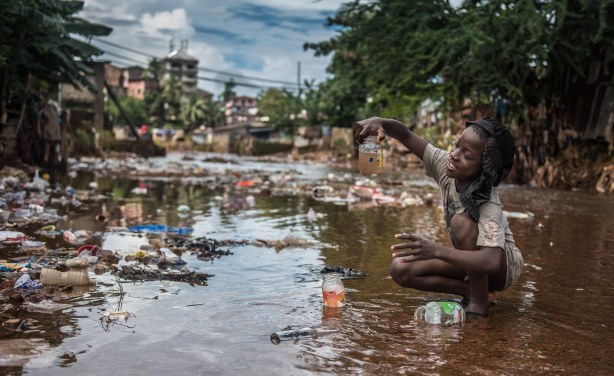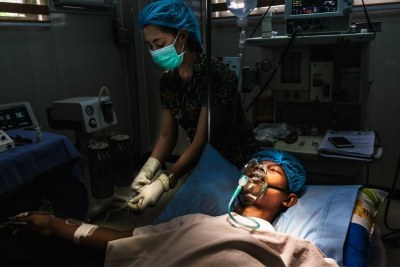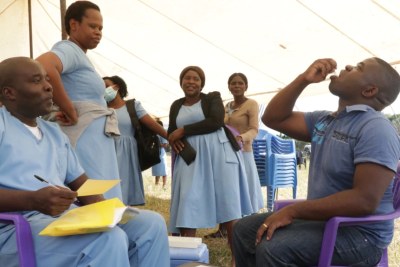-
Africa: Why Cholera Continues to Threaten Many African Countries
The Conversation Africa, 14 January 2023
Malawi is facing its worst cholera outbreak in two decades. The outbreak started early in 2022 and has, so far, resulted in over 18,000 cases and the loss of 750 lives. It's also… Read more »
-
Malawi: Govt Asks WHO for 7.6 Million Doses of Cholera Vaccine
Nyasa Times, 25 January 2023
The Malawi government has asked for a donation of 7.6 million doses of cholera vaccine from the World Health Organisation (WHO). Read more »
-
Malawi: Malawi Runs Out of Oral Cholera Vaccine As Death Toll Continues to Soar
Nyasa Times, 25 January 2023
Malawi has run out of oral cholera vaccine stocks, triggering fears of more cholera cases as the death toll continues to rise. Read more »
-
Malawi: Former Finance Minister Mwanamvekha Tells Govt to Control Cholera Outbreak
Nyasa Times, 23 January 2023
Former minister of Finance in the Democratic Progressive Party (DPP) led government Joseph Mwanamvekha has told the government to control the cholera outbreak as the death toll… Read more »
-
Malawi: Malawi Reopens Schools Despite Rise in Cholera Cases
VOA, 17 January 2023
There was visible excitement among students when schools reopened Tuesday in Malawi's two biggest cities, Lilongwe and Blantyre, after a two-week suspension caused by a cholera… Read more »
-
Malawi: Save the Children Donates Medical Supplies to Malawi Govt
Nyasa Times, 18 January 2023
As the cholera scourge continues to claim lives of productive Malawians, Save the Children International - a child rights-based organization - on Wednesday donated medical drugs… Read more »
-
Malawi: Society of Medical Doctors Urges Authorities to Encourage Students to Get Cholera Vaccine
Nyasa Times, 17 January 2023
The decision to delay the normal school opening calendar in some parts of the country was one of the government's first response to cholera outbreak. Read more »
-
Malawi: Unicef Delivers Anti-Cholera Supplies to Malawi
VOA, 14 January 2023
The U.N.'s children's agency, UNICEF, has handed over lifesaving supplies worth about $300,000 to support Malawi's fight against a cholera outbreak which has killed more than 700… Read more »
-
Malawi: Govt Closes Schools As Cholera Outbreak Spreads
Scrolla, 11 January 2023
The authorities in Malawi have suspended primary and secondary schools in two major cities following a cholera outbreak that has killed hundreds of people. Read more »
Why Cholera Continues to Threaten Many African Countries
Malawi is facing its worst cholera outbreak in two decades. The outbreak started early in 2022 and has, so far, resulted in over 18,000 cases and the loss of 750 lives. It's also forced the closure of schools and many businesses.
Cholera is a disease caused and spread by bacteria - specifically Vibrio cholerae - which you can get by eating or drinking contaminated food or water. It's an old disease which has mostly affected developing countries, many of which are in Africa. Between 2014 and 2021 Africa accounted for 21% of cholera cases and 80% of deaths reported globally.
African governments must acknowledge that the burden of cholera is huge, writes Samuel Kariuki for The Conversation, and it could get worse unless governments put measures in place to control and prevent outbreaks by addressing water and hygiene infrastructure.
InFocus
-
Malawi's worst cholera outbreak in two decades has left up to 704 people dead after the disease spread to all districts of the southern African country with the authorities having ... Read more »
-
Malawi has been plagued by cholera outbreaks for many months and the latest outbreak has seen cases rise from 110 at the beginning of October 2022 to 183 at the start of November, ... Read more »
-
The World Health Organisation (WHO) has published a report highlighting the first-ever list of fungal "priority pathogens" that represent the greatest threat to public health. ... Read more »
-
A lack of global supply has prompted the international body which distributes oral cholera vaccines during outbreaks and emergencies to temporarily suspend the standard two-dose ... Read more »

Cholera is an acute diarrhoeal infection caused by eating or drinking food or water that is contaminated with the bacterium Vibrio cholerae.







